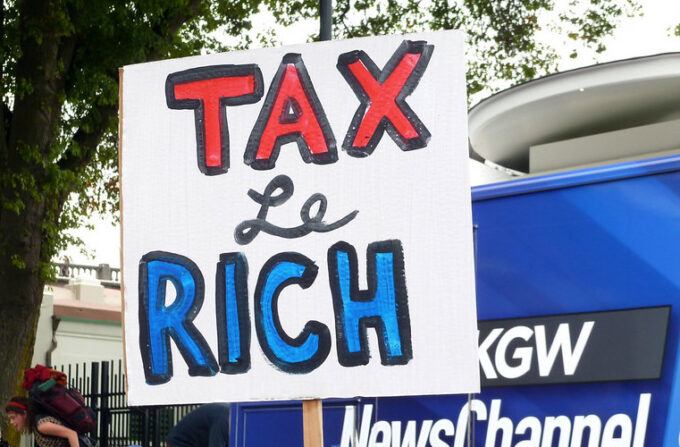Could any of this change? Advocates for global tax justice certainly think so. What has them so hopeful? Last November, the UN General Assembly adopted — over stiff opposition from the United States and the European Union — a ground-breaking resolution that has begun the process of establishing a new international tax order.
Under this new order, the UK-based Tax Justice Network points out, control over global tax rules could end up shifting from the OECD — the “small club of rich countries” where that control has sat since the 1960s — to the UN. That would amount to an incredibly significant switch. For decades now, notes the Network’s Alex Cobham, “tax havens and corporate lobbyists” have been having much “too much influence” on the OECD’s tax decisions.
Earlier this week, the “Ad Hoc Intergovernmental Committee” set up to begin implementing November’s historic UN tax resolution wrapped up its initial substantive session, a nearly two-week-long dialogue in New York that gave nations and public-interest groups worldwide an opportunity to help shape the framework for a new international tax order.
Without a robust new order, the Tax Justice Network’s Markus Meinzer told the ad hoc panel, our planet’s ongoing “tax abuse by multinational corporations and wealthy individuals” will likely cost the world’s nations “nearly $5 trillion in tax revenue” over the next decade.
What might a robust new international tax agenda include? Advocates for fair taxation began circulating late in April an “ABCs of Tax” to highlight the progressive options that ought to be sitting on the worldwide tax reform table, everything from the creation of a “global asset registry” that can bring “transparency to the assets of the superrich” to a “formulary apportionment” that makes sure corporations get taxed “where they create, not book, profits.”
Individual national bodies like the Norwegian Academy of International Law have urged the UN’s new ad hoc tax panel to include within the global tax reform mix controls on “harmful tax competition” between nations and “tax-related illicit financial flows.” These Norwegians are also calling for measures to ensure at least a minimum tax bite on the wealth of our wealthiest.
The Nairobi-based Tax Justice Network Africa, an organization that represents 44 advocacy groups from 26 African nations, shares those sorts of priorities for reform. This African network is also strongly urging the UN’s ad hoc panel not to operate on a decision-making model that requires complete “consensus” for adopting recommendations.
That “consensus” approach to decision-making, the Tax Justice Network Africa points out, places “undue pressure on developing countries to accede to tax deals that are unfavorable to them.” Adds the network: “Voting solely via consensus has been proven to be undemocratic.”
The UN General Assembly is now expecting the ad hoc committee to finalize its work this summer. A UN General Assembly vote on what to do with that work will most likely come in November.
That vote’s stakes, the UK-based Tax Justice Network reminds us, could hardly be higher. The power to tax, after all, remains “our social superpower,” our best lever for organizing ourselves “to live better, healthier lives together.”
That lever rests on what the Network has dubbed taxation’s “four Rs.” Through fair taxation, we can gain the revenue to support needed public spending. We can make the redistribution that can curb “damaging inequalities.” We can do the repricing that can regulate “socially harmful practices from tobacco consumption to carbon emissions.” And finally, through fair taxation, we can help ensure that all of us can get to enjoy effective political representation, not just the wealthiest among us.
Will we end up able to do all this ensuring? Advocates for fair global taxation, notesthe Tax Justice Network, have since last fall registered a level of progress that “has for decades been considered impossible to achieve.” Now the real fireworks can begin.

